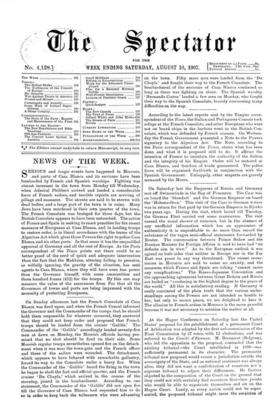At the Hague Conference on Saturday last the United States'
proposal for the establishment of a permanent Court of Arbitration was adopted by the first sub-commission of the First Commission by 27 votes, with 12 • abstentions, and was referred to the Collate d'Examen. M. Beernaert-(Belgium), who led the opposition to the proposal, contended that the existing tribunal—the Court established in 1899—was sufficiently permanent in its character. The permanent tribunal now proposed would create a jurisdiction outside the sovereignty of the State, and as national sentiment was always alive, they did not want a confederation of countries nor a supreme tribunal to adjust their differences. He further objected to the composition of the Court on the ground that they could not with certainty find seventeen first-class jurists who would be able to expatriate themselves and- sit on the Hague Court. Lastly, as every nation could not be repre- sented, the proposed tribunal might incur the BURriCiOD, of partiality. The proposal was supported by Sir E. Fry (Great Britain) and M. Bourgeois (France), with the reserve that the new Court should not supersede or interfere with the Court of 1899. That Court, M. Bourgeois uontended, was for political disputes, but for purely juridical disputes he believed the parties would prefer a permanent Court. In the Ccnnite d'Examen, a majority of the powers, including Great Britain, Italy, Japan, and the United States, negatived the proposal conferring on a belligerent full power to convert merchantmen into warships on the high seas.



































